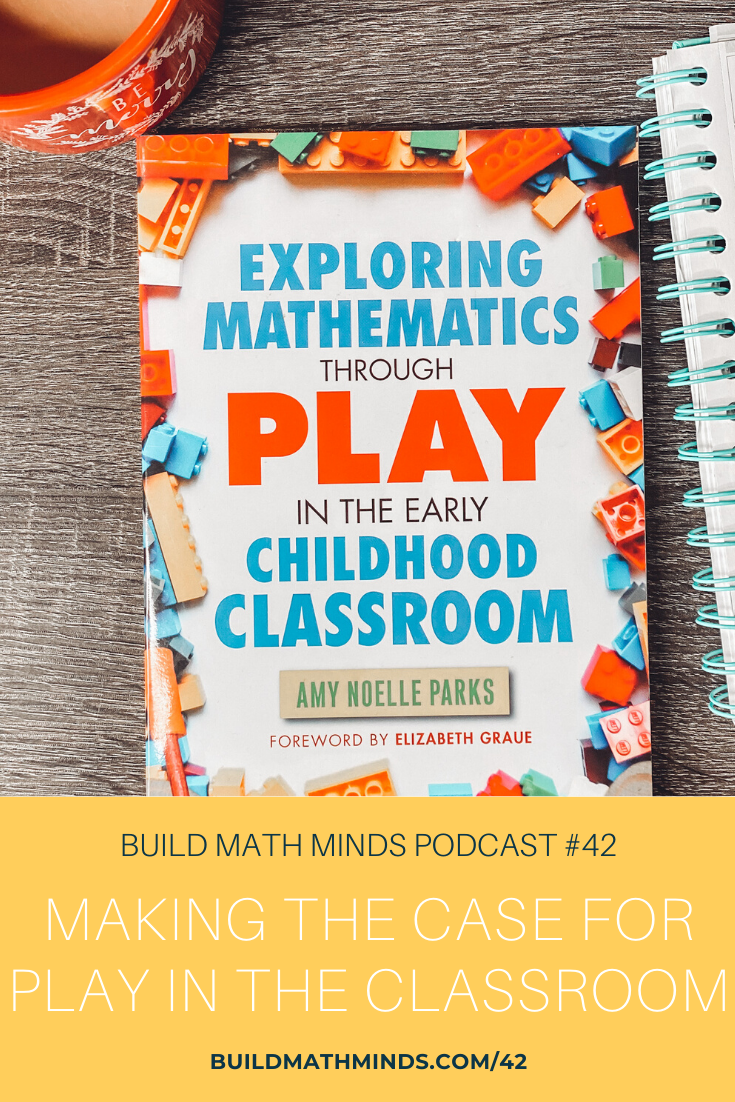Resources mentioned in this episode:
Interested in becoming a member of the Build Math Minds PD site? Go here to get details and join the waitlist: buildmathminds.com/bmm
Exploring Mathematics Through Play in the Early Childhood Classroom by Amy Noelle Parks
Welcome fellow Recovering Traditionalists to Episode 42. Today we are Making the Case for Play in the Classroom
As I’m recording this it’s the holiday season and it’s the time of year when teachers break out all kinds of fun activities and just let the kids play. I mean, how else are you going to survive that last week before break, right!?!?
So with all this play happening, I pulled out the book Exploring Mathematics Through Play in the Early Childhood Classroom by Amy Noelle Parks.
Now, even though this book is full of ideas for the early childhood classroom she makes some great points that apply no matter what grade level you work with. In particular, I’d like to read a longer passage than normal to you because I think you need the whole passage to get the full picture of the point Amy is making.
On pages 130-132 she writes:
“There is a great deal of evidence supporting the incorporation of play into the classroom, and that evidence can be particularly useful in getting support from administrators and parents. However, research on what works alone cannot guide our actions in the classroom. For example, we could imagine a research study that demonstrated that administering electric shocks to children led to higher test scores. And yet, even in the face of this ‘evidence,’ no one would advocate such a practice. We are responsible for asking not just whether a pedagogy works, but also whether it is ethical to use with children.
There are a couple of ways to frame this question in relation to play. The most common ethical argument is probably that using play with young children is developmentally appropriate. For example, in their handbook, the National Association for the Education of Young Children states that ‘play needs to be a significant part of the young child’s day – and part of a developmentally appropriate classroom’ (Copple & Bredekamp, 2009, p. 328). To back up this statement, the handbook draws on research such as that described in this book, which demonstrates the physical, social, and cognitive benefits of play for young children. Examples are also provided of instruction that is not developmentally appropriate, such as allocating little or no time for play, drawing heavily on workbooks for instruction, or talking or reading for long periods. From this perspective, play is to be preserved for young children because they are in particular need of it and because other kinds of instructional strategies are not well-suited to small children.
This argument is fine as far as it goes, but many of the practices critiqued in the handbook – having children sit for long periods of time, asking only fact-oriented questions, not taking into account children’s ideas, not providing enough time for independent exploration – are harmful to children regardless of age. These practices, which children throughout elementary school find stressful, do not become appropriate because a certain number of birthdays have passed.
I believe teachers need an ethical stance that encourages us to pay attention to the children in our rooms and the impact of our pedagogies on them (not just on their test scores). Mikhail Bakhtin, a Russian philosopher, put forward a theory of ethical behavior designed to draw people’s attention to the particular context of each moment they experience with others. In doing this, he was contrasting his view of moral standards with that of German philosopher Immanuel Kant. Kant argued that we should make decisions based on categorical imperatives, working off laws that could be applied universally without regard to particular contexts. From this perspective, we could set guidelines for different grade levels about the amount of minutes of indoor and outdoor play required for children that age and the amounts of seatwork that should be allowed.
In contrast, Bakhtin (1990) said that ethical action cannot be taken without responsiveness to the people in the moment with you. He called this responsiveness ‘answerability.’ He wrote:
I myself-as the one who is actually thinking and who is answerable for his act of thinking-I am not present in the theoretically valid judgment. The theoretically valid judgment, in all of its constituent moments, is impervious to my individually answerable self-activity. (p.4)
This means that as a teacher I cannot simply turn to guidelines-even developmentally appropriate ones-to decide what it is okay to do in my classroom. If my children are miserable, it is not enough to say that they have had the appropriate amount of play and so must return to seatwork. ‘I, myself-as the one who is actually thinking’ must decide what it is ethical to do based on what I see happening with the children in front of me. This stance calls on us as teachers to see with fresh eyes the children in our classrooms. If they routinely cry, if they get into arguments, if they become impatient or angry, then we must ask ourselves if the conditions of the classroom are in some way responsible. We cannot justify practices that we identify as harmful because they are required in the standards, by the district, or in order for children to be successful in later grade levels. In fact, Bakhtin refers to these outside requirements as alibis, and argues that we cannot use them to justify behavior we know to be unethical.
From this perspective, we, as the adults in the classroom with the children, need to take responsibility for our decisions to deny or to allow children opportunities to play.”
And I could have the mic drop right there and not continue on but I don’t want you taking away from that that it’s the teachers fault if kids are acting out. I wanted to use this passage to encourage you to stand up against the things you see your school or district doing that they say are ‘research-based’ yet you see how it plays out in the actual classroom with your actual kids.
Even though she is talking about using more play in the classroom, this really goes for anything happening in your classroom. Are you required to give tests that you see as harmful to your students? Do you have to do mad minutes? Whatever it is, it’s time to stand up for the ethical side of what other people are asking of our students.
For those of you who are wanting more resources for incorporating play, members of the Build Math Minds PD site, I’ll remind you that you have some great videos inside the site about including more play in your classroom. Most of them are inside the Virtual Math Summit area of the site. For everyone else, I’ll link to the book by Amy on the show notes page buildmathminds.com/42
Subscribe and Review in iTunes
Hey, are you subscribed to the Build Math Minds Podcast, yet? If you’re not, make sure to do that today because I don’t want you to miss any episodes! Click here to subscribe to the podcast in iTunes.
While you’re there, don’t forget to leave a review on iTunes too. I would love to know your thoughts and how we can make sure that we give you content that you will really enjoy.
To leave a review, head over to iTunes and click on “Ratings and Reviews” and “Write a Review.” I can’t wait to hear your thoughts about the podcast.





LOVE, LOVE, LOVE what you have to say here! Do what’s best for my TK kids!
Christina, Thank you for this episode. Amy’s book sounds interesting and the ideas about play for children can apply to more than just the early childhood level.